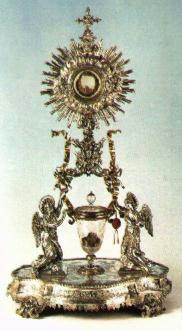 WILL YOU BE A ROMAN CATHOLIC MENNONITE?
WILL YOU BE A ROMAN CATHOLIC MENNONITE?
For those of you who have taken the time to read the latest (December 2007) issue of the MB Herald you may have noticed that there are several articles which appear to be pro-Roman Catholic. (To link directly to the articles, click on the underlined words).
The first is an article entitled Pope greets Mennonites: a first in church history (a Mennonite World Conference release). Here are a few quotes from the article:
“Since it is Christ himself who calls us to seek Christian unity, it is entirely right and fitting that Mennonites and Catholics have entered into dialogue in order to understand the reasons for the conflict that arose between us in the 16th century. To understand is to take the first step towards healing,” said Benedict XVI, in his short address.My question for the Mennonite World Conference and the editor of the MB Herald is this: "Is it biblical to sacrifice truth for the sake of peace or unity, and what is true unity based upon?". Also, "Do they honestly believe that 'they have a high regard for our theology'?", and if they do I would suggest that either there is something wrong with Mennonite theology, or maybe the Mennonites don't really understand Catholic theology or vice versa.
“My impression of the whole four days was that they have a high regard for our theology,” added Canadian delegate Ron Penner, from the Evangelical Mennonite Conference.
~~~
Next to be found is the article What I learned from my 7-year Mennonite-Catholic dialogue by Harold Jantz, in which he says:
My experience in these encounters with Roman Catholics has led me to a number of conclusions.In the article Jantz goes on to tell of two couples who have made the journey to the Roman Catholic church from the evangelical church. He then says:
The first of these is the deepened conviction that if we are to find one another as fellow believers, it must be rooted in Jesus Christ. Genuine communion with one another can be based in one reality only and that is the confession we make that salvation is in Christ Jesus alone.
I have learned that on core issues such as salvation, we are closer than I might have thought.
For them the authority of the church to maintain faithfulness to its confession was a powerful attraction.
And so I ask, "Has the Roman Catholic church changed its doctrine, becoming more evangelical and biblical in the last 1000+ years?", and "Does the Roman Catholic church have a truly biblical confession which we can adhere to, and is it an authority which can be trusted?" These are absolute essentials in understanding this movement to unite with the Roman Catholic church. If we cannot agree that these things have happened, we have no business yoking ourselves to it, persuasive as it may be.
~~~
And then finally Mother Teresa, the "Mennonite" by James Toews. Here are some quotes from this article:
“She must be a Mennonite! Who would have known?” I thought as I read, Come Be My Light: The Private Writings of the Saint of Calcutta.Upon first reading this article I thought Toews was saying this tongue in cheek (and in a way he is); however, he goes on to say "she was one of us". This begs the question, "Was Mother Teresa a Christian in the biblical sense?" I think not. A good Roman Catholic, yes, but a Christian, really? Some may think I am audacious in doubting, but one only needs to carefully examine Roman Catholic doctrine to see that there is no salvation according to the scriptures being taught in the Roman Catholic church, and Mother Teresa was a devout Catholic. Only God knows a person's heart and is the final judge, but Mother Teresa held firmly to Roman Catholic doctrine and trusted it.
So what can we take from the writings of Mother Teresa, the “Mennonite”?
For me it was a reminder that we are the ancestors of a culture, like Mother Teresa’s, that taught and lived radical obedience and self-sacrifice. The world may not have idolized our “saints,” but they worked, built, served, sacrificed, and preached to the “poorest of the poor” just as Mother Teresa did. And they did it with their whole lives. Their stories are still alive among us.
Not all is familiar, of course. Mother Teresa represents a facet of the Christian world as bizarre and exotic as a Western Protestant can imagine. It is the world of ancient Catholicism, of vows and blind obedience, of monastic orders. The fact this foreign Mother Teresa wasn’t easy to understand is not surprising.
Come Be My Light is a timely reminder of the fundamental humanity of our heroes. For all the adoration given her, Mother Teresa was not perfect. She was a remarkable person to be sure but she also fought selfishness, pride, despair, judgementalism, and a host of other very human maladies. Putting our heroes on pedestals that can’t accommodate reality serves no one well. She was not above reproach and what she accomplished is only made more remarkable when we realize she was one of us.
Pride is a complex sentiment, but we should be proud of our “saints” and, like Malcolm Muggeridge, tell their stories well. Their feats are extraordinary. The fact that we already know them to be human and fallible only makes their stories richer.
The real issues here are the definition of the gospel, and who is saved according to Scripture. Only this determines whether or not we can consider Roman Catholic followers to be fellow-believers and co-labourers in spreading the gospel. This has massive implications, because if we are, then we no longer need to evangelize Roman Catholics. This would mean that they are already saved. It also ignores the reality and severity of the widespread persecution and death inflicted upon her resisters which took place over the centuries for those who opposed what they considered to be a false religious system.
Let us look at the false religious system called the Roman Catholic church.
(Go to BereanBeacon to hear the message Unmasking the Pope and the Catholic System by John MacArthur for a more detailed explanation, which is the source for the following items)
*It has a false priesthood, proclaiming the Pope to be the "Vicar of Christ" (the one who stands in the place of Christ). Biblical Christianity proclaims the priesthood of all believers with Christ alone as our High Priest.
* It follows a false source of revelation: tradition and the magisterium
*It has illegitimate power granted to it by it's hierarchical system
*It engages in idolatry and the veneration of saints. Scripture says all who follow Christ are His saints, and they need no veneration
*It gives Mary an exalted place above Christ
*It enforces celibacy on its representatives, which is an unnatural state and a gift only given to a few
*It conducts a twisted sacrament of the Lord's Supper in the Mass, in which Jesus is sacrificed again and again.
*It offers forgiveness through the confessional
*In it a person is able to participate in the acquisition of salvation by performing good works
*It calls for the unscriptural and useless sacrament of infant baptism
*It is motivated by money, and driven by the unbiblical doctrine of purgatory which hold the whole system together. This is its safety net.
*In it you can never know if you're saved and are going to heaven, but rather uses guilt and fear to retain its members.
*And to top it all off, there is the PAPACY, which has usurped the headship of Christ as the head of His church, declaring all others to be outside of Christ if they are outside of the Roman Catholic church.
Here are some recent examples of the Roman Catholic church's continuing unbiblical practices:
PURGATORY AND INDULGENCES
From BBC http://news.bbc.co.uk/2/hi/europe/7131088.stm
Thursday, 6 December 2007, 16:44 GMT
|
|
|
| |
Pope Benedict XVI places great importance on indulgences Pope Benedict XVI has authorised special indulgences to mark the 150th anniversary of the Virgin Mary's reputed appearance at Lourdes.
Catholics visiting the site within a year of 8 December will be able to receive an indulgence, which the Church teaches can reduce time in purgatory.
Lourdes has drawn pilgrims since Mary was said to have appeared in 1858 to shepherdess Bernadette Soubirous.
The waters of the French shrine are said to have miraculous healing powers.
The Pope is expected to visit the shrine next year.
The pontiff also said believers who prayed at places of worship dedicated to Our Lady of Lourdes from 2-11 February next year - or who were unable to make the journey - would also be able to receive indulgences.
The decree was signed by US Cardinal J Francis Stafford, who is head of the Apostolic Penitentiary, a Vatican court dealing with indulgences and matters of conscience. Indulgences became infamous in the 16th century for being sold rather than earned, helping, historians say, trigger the Protestant reformation. While some might consider indulgences an outdated concept, great spiritual importance have been assigned to them by Benedict XVI and his predecessor, Pope John Paul II.
INDULGENCES AND PURGATORY
A plenary indulgence offers full pardon of the temporal punishment (suffering in this life or the next) due to sins already forgiven in confession
Purgatory is a kind of spiritual waiting room - for people who do not go directly to paradise or hell after death - to purify souls of residual sin before they enter heaven
From http://www.therealpresence.org/eucharst/pea/a2.html
 Lanciano" border="0" height="331" hspace="2" vspace="2" width="182"> Lanciano" border="0" height="331" hspace="2" vspace="2" width="182"> | Perpetual Eucharistic Adoration is the adoration of Jesus Christ present in the Holy Eucharist. In the many Churches that have this adoration, the Eucharist is displayed in a special holder called a monstrance, and people come to pray and worship Jesus continually throughout the day and often the night. Christ’s great love for us was shown when he was crucified on the cross to pay the penalty for our sins and give us eternal life. He loves us without limit, and offers Himself to us in the Holy sacrament of the Eucharist. Can we not give Jesus a few minutes of love and adoration in return? |
| Lanciano |
|
From http://www.therealpresence.org/eucharst/a.html
(A Roman Catholic website)
God's love for us is poured out in the sacrament of the Eucharist, where Christ is truly present for us, giving us life and healing.
The Roman Catholic Church has consistently held fast to the belief in the Real Presence. The Catechism of the Catholic Church states:
The mode of Christ's presence under the Eucharistic species is unique. It raises the Eucharist above all the sacraments as "the perfection of the spiritual life and the end to which all sacraments tend." In the most blessed sacrament of the Eucharist "the body and blood, together with the soul and divinity, of our Lord Jesus Christ and, therefore, the whole Christ is truly, really, and substantially contained." "This presence is called 'real' - by which is not intended to exclude the other types of presence as if they could not be 'real' too, but because it is presence in the fullest sense: that is to say, it is a substantial presence by which Christ, God and man, makes himself wholly and entirely present."
- The Catechism of the Catholic Church: paragraph 1374
In many ways, Our Lord, is calling us to worship and receive Him in the Eucharist. He speaks this desire in many ways: through the Pope and the Magisterium of the Church, in the Bible (Jn. 6), through his Blessed Mother in approved Marian apparitions, through the testimonies of Saints and Martyrs, through Eucharistic miracles, through Church approved messages given by Jesus by Divine Revelation, through our souls who long for Jesus in Communion, and through our suffering world which is in much need of prayer before the Blessed Sacrament. Unfortunately many of us disbelieve or have grown indifferent towards Jesus in the Blessed Sacrament.
What is our response to this current issue, a truce with Rome? Are we going to betray the martyrs? Are we going to betray the history of our faith? Are we going to betray those who lived and died to get us the truth? Are we going to betray the Tyndales and the Luthers, Calvins and all the rest? Are we so senseless? Are we so blind? Are we so ignorant? Are we so faithless? Are we so cowardly that we will not fight?
The doctrinal ignorance of the evangelical church is shocking, matched only by its cowardice, I fear. That has certainly been revealed to everybody in the recent response to the death of the Pope and the installation of his successor. The promotion of Catholicism that we’ve seen in the media in the last couple of months has had no equal in history. This is the single greatest promotion of the Roman Catholic system in the history of that system. The world media has set aside the sickening pedophilia, the abuse issues to parade the pomp and circumstance of this false system as if it were truly all glorious. It is a classic illustration of the old story of the Emperor’s New Clothes, spiritually it’s naked. And here we are at the very time when Roman Catholicism is receiving through the devil’s medium since he controls both, its greatest exposure. It is perpetrating on the world its greatest seduction. It is bringing to the world its damning delusion as never before. And Protestants and Evangelical representatives are just embracing it and its damnable heresies. The media, have you noticed how uncritical they are? Have you noticed how they don’t ever bring up the scandal of the priests? We hear people say, “Well, Catholicism is a different denomination.” Catholicism isn’t a different denomination. It’s a different religion. I don’t think people know the difference between the denomination and a religion. Has Rome changed? No. O Rome morphs, Rome is a chameleon, whatever it needs to be in any nation in any time it will become. Whatever it takes. That’s how the devil always works. He moves, changes to become whatever wins over people.
But here is Protestant/evangelicalism abandoning sound doctrine, shaming the name of Christ. And all in bold relief so the whole world can see. And the world was watching the death of Pope John Paul II in an unrivaled spectacle of worship given to a man. And the question came up, is the Pope in heaven? And you hear all these people say, “Yes, yes, yes.” People have asked me, “Is the Pope in heaven?” And my answer is, “Is the Pope Catholic?” Isn’t that the answer? I think he is, I think the Pope is Catholic. Does he believe Catholic theology? Yes. He is the guardian of Catholic theology. Do you get to heaven by works, by Mary, by Penance, by Baptism, by confession, by Rosary? No. This is another gospel. This is not the true gospel.
**********************************************
So fellow-believers and fellow-Mennonites,
how should we respond?
********************************************************
Here are a few other resources for study on this matter:
Alignment of New Evangelicals With Apostasy (& Some Biblical Principles For Separation From Error In Doctrine & Practise) by former Roman Catholic priest Richard Bennett
Biblical Truth vs. the New Catechism













No comments:
Post a Comment